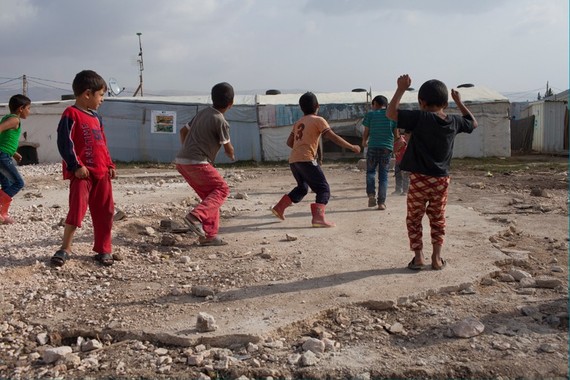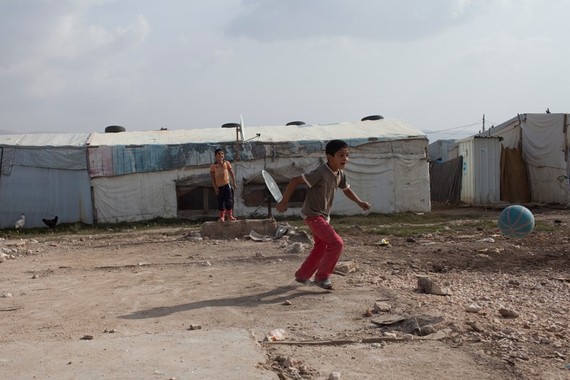About Through Their Voices serial stories:
Moaddamiyeh has been an early hotspot for anti-Assad demonstrations and the following government oppression. The town has endured the siege of the Assad regime since the end of 2012, and it is one of towns hit by chemical weapons in August 2013. Despite all the violence these activists believe in the principle of peaceful. And after five years of Syrian revolution their stories and experiences must be heard, their words reflect their struggles and hopes. Ten stories will be told through their voices.
"I'm so confused. All the memories, it's really hard to restore them. Let's see...I was studying Arabic literature at Damascus University. I had lived in Moaddamiyeh for the whole of my life. My house was located on the main road at the entrance of the city. That place where I used to smile, when I'm in the mini-bus coming back home from the university because I'm almost home. But later in 2011, it was a place used to the regime's forces to gather and plan to their raids to arrest the anti-regime demonstrators."
Basma was still a university student at the beginning of 2011. In May of that year, she had to stop going to her classes. But, thanks to the location of her family's house, she had a front-row seat, as the protests unfolded.
"I wasn't participating in the first demonstrations against Assad's dictatorship. I wasn't prepared, and maybe I didn't have the courage to! But later, I was able to watch from my own window how the regime's forces were dealing with demonstrators. How they were grabbing them by their clothing, and dragging them all over the street. They were hitting them in the worst ways that anybody can imagine. The young men and teenagers were lying on the ground and the officer was stepping on their heads saying, "Do you still want freedom? Here I'm giving you some freedom." If you were there and didn't think about standing with the revolution, I'm sure you have something wrong with you-or you are agreeing on what they were doing!"
As people's anger grew, more and more people joined the demonstrations against Assad's dictatorship. At the same time, the regime grew increasingly brutal, as it attempted to stop the uprisings in Moaddamiyeh and other suburbs of Damascus.
"Once we had a curfew for more than a week and we had Assad's forces all over the streets. They were doing raids all over the town and entering the houses one by one. Our kitchen view was all made of glass and we weren't able to enter the kitchen and get any food out of the fridge during the curfew. It was awful! You just don't even have access to your own food in your own kitchen. Can you imagine that! I tried to enter the kitchen and a soldier shouted at me 'go back or I'll shoot you in the head, bitch!' "
Later, Basama took advantage of her house's location to alert activists and demonstrators of the approach of the regime's forces. That way, they could flee the demonstration area.Basma's brother was asked to join the military in the beginning of 2012. Rather than do so, he fled Syria for Lebanon. Basma's parents and younger siblings visited him in Lebanon two months later. Basma, however, stayed home alone in order to support her peers.
In 2012, two massacres took place in Moaddamiyeh. Basma witnessed one of these massacres. After that, she fled, leaving behind scenes of blood and bodies in the streets. She joined her family in Lebanon, where she began to suffer from depression and trauma.
"I was in one of the Bekaa Valley towns and I was only 57 KM away from the middle of Damascus. It was hard to be that close to your home but you can't go! I had nothing to do but coping with my new situation. The situation around me was horrible, hundreds of Syrian families who had fled Syria with nothing but their tired souls. I needed to appreciate what at least I had. At least, I wasn't in a tent and my brother was working and we were able to afford a house to rent. The other refugees who were staying in camps were in a bad situation and I needed to do something about that. So I volunteered at one of the charities that was supporting the Syrian refugees in Lebanon."
Basma's work included providing infants in the Bekaa Valley camps with formulas, diapers and blankets. Eventually, however, the workload grew to be too much for her, and she was receiving more and more requests to support new families--including new arrivals, who often needed a place to stay.
"One day, my grandparents came to visit us for few days and I worked all day long on blankets' distribution in the camps, but when I came back home, I couldn't find myself a blanket. The next day, I was telling a friend mine who was another volunteer the story and laughing, so he went and got us couple of blankets. I was really upset, but he insisted, so I took one, and gave the others to the other Syrians in the camp."
After months of volunteer work, Basma needed to get a job in order to help her family. She was hired at one of the relief's NGOs in the Bekaa Valley. The working conditions, however, were bad. One day, the NGO informed her that they had replaced her. Basma felt this was unfair. But she had no means of filing a complaint. She found another job. It was not any better than the first one, but it gave her a chance to spend time with families in the camp.
"Working closely with the families was precious. I didn't want to sit in an office and be away from the reality. At the same time, I got a scholarship to study the Maria Montessori Education. I was really happy to study that, because I love working with children. That was also something we really needed in the camps, where children are missing a lot. Then I started to teach the kids through what I was learning, I didn't have any tools to support my work. In that camp we had a caravan which was burnt and nobody was using it so I tried to clean it up a little bit and gathered the children there every day. I insisted on doing something for those children. For example I was teaching the children how to count using crushed stones."
 There is no playground for the children so they have to improvise. Lebanon 2015. Photo: Grace Kassab
There is no playground for the children so they have to improvise. Lebanon 2015. Photo: Grace Kassab
Basma tried to get funding for the project she wanted to implement for the children in the camp implementing the Maria Montessori education system, but she wasn't able to get any positive results. She felt her depression returning.But she completed her work despite the lack of support.
"One day, we got a new donor who wanted to support families monthly. I was very happy, but that didn't last long. The donor requested pictures of the families who are going to receive the monthly support. The pictures sounded to be really humiliating. The donor asked for a picture for the family sitting down, another one in which they are standing up, a third one where they are eating, a fourth one where they are out and a long list of positions and poses for the family. I was really angry and humiliated, but I told the family what the donor asked for. They were really upset, and I stood with them. I told the donor that what he asked for is not acceptable! So, he simply gave the monthly support for another family, who were forced to accept the situation in order to prevent their kids from being starved!"
Basma felt she couldn't handle any more. She decided to go back alone to Syria, leaving her family in Lebanon. Basma returned to Moaddamiyeh, where she is living now under siege. All city crossings have been closed since the beginning of 2016. Still, she does not regret her decision.
"I came back because I feel that I belong to here! Only people who felt the humiliation and bad circumstances that refugees are going through really appreciate the dignity that you have in such a dangerous and besieged area. I will never regret my decision! It was hard at the beginning, when I came back, to cope with the siege circumstances, but now I'm really stronger. I'm working to start my project using the Maria Montessori education system with the traumatized kids who live here, under the siege. I have something to give, and I came back to give it to these children."
The story was originally published in German on WirMachenDas.Jetzt
